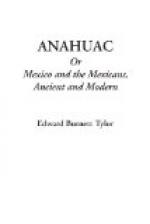Of African slaves brought into the island, the yearly number is about 15,000. All the details of the trade are matter of general notoriety, even to the exact sum paid to each official as hush-money. It costs a hundred dollars for each negro, they say, of which a gold ounce (about L3 16s.) is the share of the Captain-general. To this must be added the cost of the slave in Africa, and the expense of the voyage; but when the slave is once fairly on a plantation he is worth eight hundred dollars; so it may be understood how profitable the trade still is, if only one slaver out of three gets through.
The island itself with its creeks and mangrove-trees is most favourable for their landing, if they can once make the shore; and the Spanish cruisers will not catch them if they can help it. If a British cruiser captures them, the negroes are made emancipados in the way I have already explained.
Hardly any country in the world is so thoroughly in a false position as England in her endeavours to keep down the Cuban slave-trade, with the nominal concurrence of the Spanish government, and the real vigorous opposition of every Spaniard on the island, from the Captain-General downwards. Even the most superficial observer who lands for an hour or two in Havana, while his steamer is taking in coals, can have evidence of the slave-trade brought before his eyes in the tattooed faces of native Africans, young and middle-aged, in the streets and markets; just as he can guess, from the scored backs of the negroes, what sort of discipline is kept up among them.
We slept on board the steamboat off the pier of Batabano, and the railway took us back to Havana next morning.
CHAPTER II.
HAVANA TO VERA CRUZ—VERA CRUZ TO MEXICO.
On the 8th of March, we went on board the “Mejico” steamer, American-built, and retaining her American engineers, but in other respects converted into a Spanish vessel, and now lying in the harbour of Havana bound for Vera Cruz, touching at Sisal in Yucatan. At eight o’clock we weighed anchor, and were piloted through the narrow passage which leads out of the harbour past the castle of El Morro and the fort of Cabanas, the view of whose ramparts and batteries caused quite a flourish of trumpets among our Spanish fellow-passengers, who firmly believe in their impregnability.
Among our fellow-passengers were a company of fifth-rate comedians, going to Merida by way of Sisal. There was nothing interesting to us about them. Theatrical people and green-room slang vary but little over the whole civilized world. There were two or three Spanish and French tradesmen going back to Mexico. They talked of nothing but the dangers of the road, and not without reason as it proved, for they were all robbed before they got home. Several of the rest were gamblers or political adventurers, or both, for the same person very often unites the two professions out here. Spain and the Spanish American Republics produce great numbers of these people, just as Missouri breeds border-ruffians and sympathizers. But the ruffian is a good fellow in comparison with these well-dressed, polite scoundrels, who could have given Fielding a hint or two he would have been glad of for the characters of Mr. Jonathan Wild and his friend the Count.




